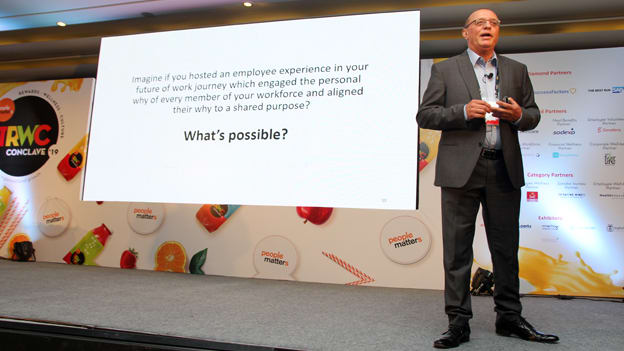An economy of emotions vs. emotional economy at work

In a landscape faced with changing trends, emerging skills and evolving employee expectations, the need to be able to tap into the right talent pools is increasing. Besides this, with gigantic leaps in technology becoming the norm, there is also a growing need to be able to stay human and to augment ourselves without losing our inherent humanness.
It is probably with that perspective that emotions are lot more valued at work today that they were in the recent past. The TRWC Conclave opened today with a dialogue on Emotional Economy at work - New ethos of engaging the workforce. At present, organizations are faced with the need to enable engagement that goes beyond physical commitment to one’s work. With talent being regarded as a consumer, providing a great digital experience in a necessity today. In this equation, how can an organization leverage technology to augment its collective empathy quotient?
What Ester Martinez, CEO and Editor-in-Chief at People Matters stressed on in her introduction to the topic was that we must look at more that the mere intellectual definition for empathy. Based on research by IDO, she added that to build empathy we might often be needed to change our perception, limit ourselves, put in effort to do things on our own and also engage in analogue ways to help us understand each other better.
Jeremy Scrivens, Director at the Emotional Economy at Work, spoke of how the Internet of Things has opened up to us the Wholeness of Things as well. This part v/s whole perspective is what he feels brings in the question of using technology to share a more wholesome experience.
Speaking on the changes that organizations have undergone at large, Scrivens points out that while earlier power and control had to flow from the top, today the need is for equity and fairness in the distribution of power, while the stress earlier was on logic, data and numbers, the focus is now shifting to a future of mystery and shared stories backed by data, that we are moving from the norm of organization-owned data to the norm of individual-owned data shared by the organization, from our view of the leader as a hero to the leader as a host and more importantly towards a future that is collaborative, human and rooted in emotion, well-being and wholeness.
Scrivens says that, “Companies today work in silos, are single-enterprise, job-titled and hierarchical and yet we talk of collaboration.”
While the irony is apparent, the fact that companies are willing to talk about collaboration (albeit to follow the trend) is probably a step forward in understanding the need for empathy and cooperation at work.
The article above is based on the session by Jeremy Scrivens at the Total Rewards & Wellness Conclave 2019.
















